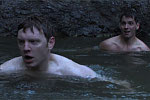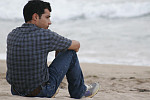 Shadows off the beaten path
Shadows off the beaten path< < I N D I E S > >
last update 2.Apr.09
See also: SHADOWS FILM FESTIVAL
 R E V I E W B Y R I C H C L I N E
R E V I E W B Y R I C H C L I N E
scr Kelly Moss, Shamim Sarif
with Lisa Ray, Sheetal Sheth, Antonia Frering, Dalip Tahil, Nina Wadia, Ernest Ignatius, Siddiqua Akhtar, Amber Rose Revah, Anya Lahiri, Kimberly Jaraj, Sam Vincenti, Rez Kempton
 release US 21.Nov.08,
release US 21.Nov.08, UK 3.Apr.09
08/UK 1h20

 A decent plot and strong characters can't quite overcome the limitations of this low-budget film, mainly because the director struggles to inject much energy or spark into the story. Which is frustrating for a premise with this much potential.
A decent plot and strong characters can't quite overcome the limitations of this low-budget film, mainly because the director struggles to inject much energy or spark into the story. Which is frustrating for a premise with this much potential.
In Amman, Tala (Ray) constantly breaks off engagements, to the consternation of her Christian parents. The latest wedding looks like it's going ahead, but during a trip to London, Tala visits a pal (Kempton) who's dating a Muslim Indian, Leyla (Sheth). Sparks ignite between the women, who both know there's no way they can pursue a romance due to the demands of their home cultures. Even so, Leyla decides she has to be true to herself, but Tala believes she needs to follow through with her marriage in Jordan.
The film strikes a breezy rom-com tone, so it's fairly clear where everyone will end up, even though the plot cleverly twists and turns the situations. It helps that the characters are vivid and detailed, even if personalities are painted in broad brush strokes. Most characters are thoroughly likeable, and the combinations of ethnicity, religion and sexuality provide plenty of material for the filmmakers and the cast members to work with.
So it's extremely frustrating that it never gets beneath the surface. The direction stiffly focuses on lame comedy shtick (a corny subplot about Wadia's snide housekeeper is particularly weak). There are a few good lines ("But some of my best friends are Lebanese!"), but most of it is played too broadly to resonate. And sexuality and racial issues are shown in extremely obvious ways. Underneath this, the script raises some seriously strong issues, examining the tension between acceptability and happiness.
Essentially, this is one of those films that feels like it was made too quickly. The screenplay needed at least two more drafts to fix the dodgy plotting and, more importantly, to eliminate the stereotypes. This under-development leaves the plot with little pacing or momentum, even though we do root for Leyla and Tala to deal with their personal issues and live happily every after. It's just about engaging enough, but it should have been much, much better.
23.Feb.09
 R E V I E W B Y R I C H C L I N E
R E V I E W B Y R I C H C L I N E
scr Philippa Goslett
with Javier Beltrán, Robert Pattinson, Matthew McNulty, Marina Gatell, Simón Andreu, Esther Nubiola, Arly Jover, Vicky Peña, Ferran Lahoz, Rubén Arroyo, Diana Gómez, Christian Rodrigo

release UK 29.Mar.09,
US 8.May.09
08/UK 1h47

 The raw power in the true story makes this film worth seeing. Although the filmmakers are far too timid in the way they approach the central theme, never generating the badly needed passion to go with the wrenching drama.
The raw power in the true story makes this film worth seeing. Although the filmmakers are far too timid in the way they approach the central theme, never generating the badly needed passion to go with the wrenching drama.
In 1922 Madrid, Federico García Lorca (Beltran) is a quiet poetic genius at university, where he meets bold visual dramatist Luis Buñuel (McNulty) and flamboyant artist Salvador Dalí (Pattinson). As these three shake up the art scene with their avant-garde approaches, they become increasingly close as friends and collaborators. Federico is so fascinated by Salvador that he doesn't notice that his best friend Margarita (Gatell) is in love with him. And when Luis heads off to Paris to make his fortune, Federico discovers a new bond with Salvador that just might be true love.
This is a fascinating point in European history, when poets, painters, musicians and writers created all-new movements that changed the world. They lived against the flow of society, exploring philosophy and psychology, experimenting with the forbidden and discovering more honest ways to live. Morrison captures this with lushly shadowy cinematography and unfussy period design, populating the scenes with lively characters, provocative dialog and witty references to the artists' later work. Unfortunately, he refuses to be as truthful as his characters, watering-down the sexuality that defines their interaction.
As a result, it's difficult to engage with either Lorca's increasing political activism or Dali's indulgent artistry, both of which are actually symptoms of something else. And what's left is a kind of 90210 angst, complete with beautiful emo actors moping to the camera. Pattinson rises above this due to his remarkable presence and skill at bringing out subtleties. But this leaves Beltran feeling a bit vacuous when he's the one who should have all of our sympathy.
Even during the sex scenes, the film feels frightened of its own sexuality. There's plenty of aching yearning and some darkly dangerous encounters, but for the film to work we need to understand why and how these men are drawn to each other, even though homosexuality was both forbidden and denied in this time and place. And by shying away from the big issue, Morrison leaves us feeling oddly removed from what is otherwise a beautiful, heartbreaking story.
18.Feb.09
 R E V I E W B Y R I C H C L I N E
R E V I E W B Y R I C H C L I N E
with Ian Scott McGregor, Lucas Alifano, Lindsay Benner, Chris Yule, Rob Hatzenbeller, Bradly Mena, George Nachtrieb, Jon Wolanske, Sarah Nealis, Nathan Pratt, Bill Simpson, Jeff Malloy
 release US Mar.08 sxsw,
release US Mar.08 sxsw, UK 24.May.10 dvd
08/US 1h14

 Ethereal and moody, this is the kind of film that holds our interest even though nothing really happens in it. But strong production values and internalised performances keep us engaged.
Ethereal and moody, this is the kind of film that holds our interest even though nothing really happens in it. But strong production values and internalised performances keep us engaged.
Jasper (McGregor) is writing an email to his girlfriend, telling her about an eventful Halloween night out with his friends: gay buddy Mark (Alifano), mopey Lily (Benner) and troublemaker Caleb (Yule). Without a plan, they drift through a crowded San Francisco street to a too-cool house party, then get lost in Golden Gate Park on the way to another party. Along the way, Jasper and Mark finally confront a brief romantic moment they shared in high school.
Writer-director Fleming keeps the film focused on the introspective feelings of the characters, and the cast is strong enough to carry this off. The entire film lives in the eyes and body language of the actors. And it's shot with lush, dreamlike cinematography, while the editing constantly suggests that something else is going on here as it cuts back and forth surreally between the city, woods and the coastline. This creates a dark, creepy tone that insinuates that something is going to happen, although as it progresses we begin to realise that everything is in their minds.
Fleming cheats a bit: for a story told in Jasper's voice, we see far too many scenes he isn't in. And all of the portentous hints add up to a whiff of air that the characters try to convince themselves is something hugely important. Maybe it is, but, by refusing to actually face up to what may have happened (or may be happening) between them, Jasper and Mark have created an elephant in the room out of thin air.
Ultimately this is a film about a mood, a sense of the past that's infused with both regret and hopefulness. And we do feel this: Jasper and Mark seem to wish they'd made a go of it then and also that it never happened at all. But by refusing to bring any focus to the film, Fleming makes it difficult to like. Despite the gorgeous imagery, music and acting, the final impression is of untouchability. Which is also a recognisable feeling.
30.Mar.09 llgff
 R E V I E W B Y R I C H C L I N E
R E V I E W B Y R I C H C L I N E
scr Dustin Lance Black
with Alex Loynaz, Justina Machado, Hale Appleman, DaJuan Johnson, Matt Barr, Jenn Liu, Karolin Luna, Anibal O Lleras, Teresa Hernández, Alexis Garcia, Amy Lewis, Richard Glatzer
 release UK Mar.09 llgff,
release UK Mar.09 llgff, US Apr.09 tv
08/US 1h30


 Stirring writing and acting helps overcome bland TV-movie production values to bring this true story to life. Even as it turns the central figure into a saint, we recognise the extraordinary nature of what he did.
Stirring writing and acting helps overcome bland TV-movie production values to bring this true story to life. Even as it turns the central figure into a saint, we recognise the extraordinary nature of what he did.
In 1994, Cuban-born Pedro Zamora (Loynaz) was cast in MTV's Real World because producers wanted to shake things up with a housemate who was HIV-positive. At 21, this bright young man is already an outspoken gay activist, and the reality show house is split when the homophobic Puck (Barr) turns on him. But the rest of the residents come over to Pedro's side, and by the time he dies of Aids-related causes while the programme is airing, they have taken up his campaign.
Structured out of sequence with to-camera interviews, exactly like Black's Milk script, this story unfolds for maximum political and emotional effect. There's a sharp honesty that confronts attitudes and situations face-on, drawing out the deeper themes. So the characters emerge into fascinating people we identify with, most notably Appleman's Judd, a housemate who really catches Zamora's vision for education and activism, even though he's straight.
Even though the film doesn't allow for any character shadings, Loynaz is superb as Zamora. He's an almost flawless hero from start to finish, only tainted by his under-reaction to the rampant homophobia around him, including from his sister (Machado) and other family members who refuse to accept his boyfriend (Johnson). But his message that HIV/Aids is a health issue, not religious or moral, comes through strongly. And his unapologetic approach to his life and work, especially through events shown in flashback, is seriously inspirational.
In fact, this is such a bold, moving story that it's a shame it's told in such a lacklustre way. The direction and editing are clean, but never give the film either sharp edges or a sense of artistry. It's extremely clean and tidy, overlit and shot mainly in close-ups, which limits its scope. The filmmakers also seem to brush off the more unsettling elements in favour of emotional sentimentality, which is admittedly raw, powerful and, in the end, well-earned. But you do miss the more inventive filmmaking approach of someone like Gus Van Sant.
13.Feb.09 bff


See also: SHADOWS FILM FESTIVAL
© 2009 by Rich Cline, Shadows
on the Wall